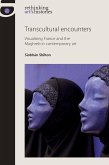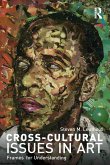Featuring studies of Canova's "Three Graces" and women artist's modernist reclamations of the female body, this book traverses the rupture of fascism and the Holocaust and ponders the significance of painting and drawing in their aftermath.
Continuing her feminist reconceptualisation of the ways we can experience and study the visual arts, world renowned art historian and cultural analyst, Griselda Pollock proposes a series of new encounters through virtual exhibitions with art made by women over the twentieth-century. Challenging the dominant museum models of art and history that have been so exclusive of women's artistic contributions to the twentieth-century, the virtual feminist museum stages some of the complex relations between femininity, modernity and representation.
Continuing her feminist reconceptualisation of the ways we can experience and study the visual arts, world renowned art historian and cultural analyst, Griselda Pollock proposes a series of new encounters through virtual exhibitions with art made by women over the twentieth-century. Challenging the dominant museum models of art and history that have been so exclusive of women's artistic contributions to the twentieth-century, the virtual feminist museum stages some of the complex relations between femininity, modernity and representation.








